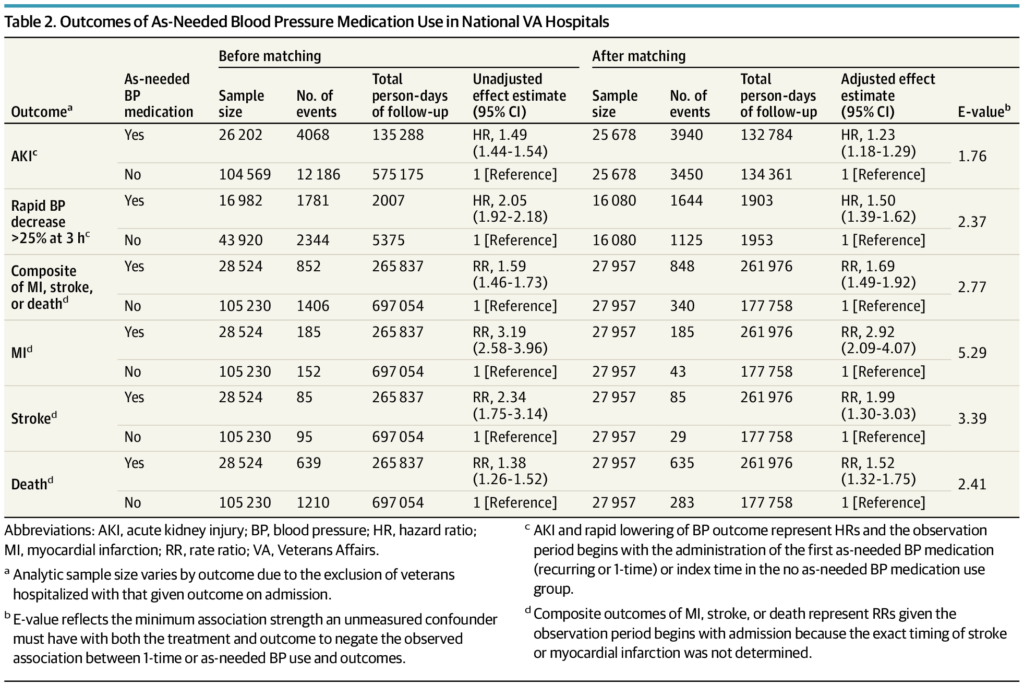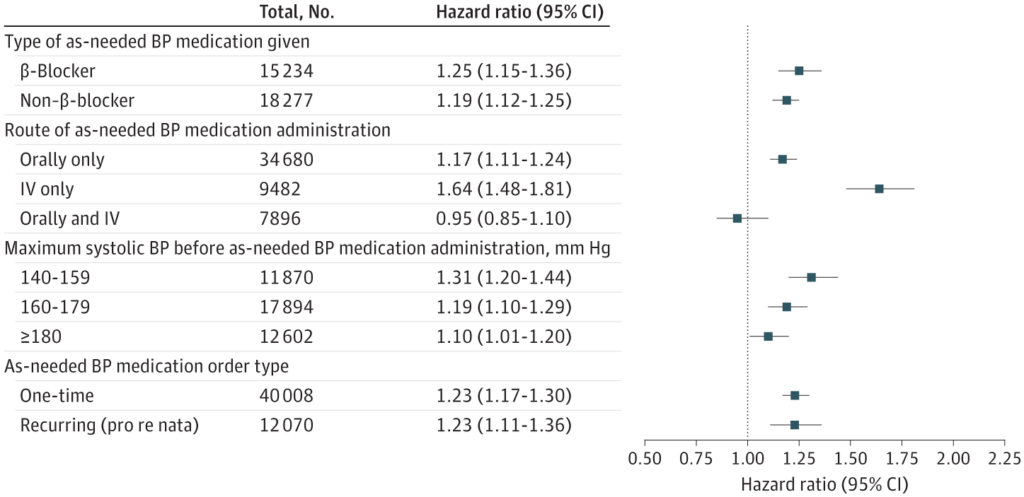GAINESVILLE, FL — In hospitalized veterans, use of at least one as-needed blood pressure medication was associated with higher risk of acute kidney injury and rapid drop in blood pressure, as well as increased risk of stroke, heart attack or death, according to a recent study.
The retrospective cohort study published in JAMA Internal Medicine examined whether treatment of asymptomatic blood pressure elevations in the hospital with recurring or one-time, as-needed medications increase the risk of acute kidney injury and other adverse outcomes.1
Study authors are affiliated with Malcom Randall VAMC in Gainesville, FL, and the Minneapolis VA Health Care System.
“Up to 70% of hospitalized patients will have a high blood pressure reading in the hospital, many of whom have no associated symptoms,” Muna Canales, MD, MS, staff physician at Malcom Randall VAMC and associate professor of medicine at University of Florida, told U.S. Medicine. “The hospital is a complex environment and there are many reasons for blood pressure to be high—stress, pain, sleep deprivation, missed home medications, to name a few. Currently, there are no guidelines to direct how we treat asymptomatic blood pressure elevations in the hospital.”
In the absence of guidelines to treat asymptomatic blood pressure elevations, providers will give one time or as-needed (PRN) blood pressure medications to rapidly lower the blood pressure, Canales explained.
“We don’t know if this practice is helpful—and it may be harmful—particularly among veterans who have chronic diseases such as hypertension, diabetes and vascular disease,” Canales said. “Rapid changes in blood pressure in the setting of chronic disease may lead to ischemic injury (or injury due to sudden drop in blood flow) to major organs. For these reasons, we felt it was important to study this common practice in the veteran population.”
This study included 133,760 adult veterans who were hospitalized in VA hospitals for three or more days from Oct. 1, 2015, to Sept. 30, 2020. Participants were required to have been hospitalized on a non-intensive care unit medical or surgical floor, must not have undergone surgery, and must have received at least one scheduled blood pressure medication in the first 24 hours of admission. Also, they must have had at least one systolic blood pressure more than 140 mm Hg during hospitalization, the researchers pointed out.
The primary outcome assessed by investigators was time to first acute kidney injury occurrence during hospitalization. The secondary outcomes evaluated included greater than 25% reduction in systolic blood pressure within 3 hours of as-needed blood pressure medication administration and the combined outcome of myocardial infarction, stroke or death during hospitalization. The research team analyzed data from April 2023 to August 2024.
“We found that, among veterans hospitalized to non-intensive care settings, use of at least one as needed (commonly known as PRN) blood pressure medication was associated with a 23% higher risk of acute kidney injury, a 50% higher risk of having a rapid drop in blood pressure and a nearly 70% increase in the risk of stroke, heart attack or death,” Canales said.
Risk of Stroke
As-needed blood pressure medication use was associated with a greater risk of acute kidney injury, rapid drop in blood pressure and the combined outcome of stroke, myocardial infarction or death, the authors suggested.
In this study, the participants’ mean age was 71.2 years, 96% were male, and 28,526 total patients (21%) received as-needed blood pressure medication. The mean baseline estimated glomerular filtration rate, a test used to check how well the kidneys are working, was 75.7 (22.7) mL/min/1.73m2, the analysis reported.
The researchers pointed out that as-needed blood pressure medication use was associated with an increased acute kidney injury risk compared to nonusers, and subgroup analyzes showed higher acute kidney injury risk with intravenous as-needed blood pressure medication use (compared to oral or combined oral and intravenous routes).
“There is probably enough evidence now to support the performance of high-quality trials that study how we should treat asymptomatic blood pressure elevations in the hospital,” Canales said. “The current practice of using PRN blood pressure medications to treat asymptomatic blood pressure elevations should be reevaluated.”
For healthcare professionals who are treating asymptomatic blood pressure elevations in the hospital, particularly in veterans, Canales suggests that a clinical trial would be needed to make definitive conclusions about when to use or not use PRN blood pressure medications.
“For now, I would advise healthcare professionals to avoid simply treating a number,” Canales said. “Consider the circumstance in which the blood pressure was taken, the patient’s baseline blood pressure, the role of missed blood pressure medications, pain, stress and other factors that may be driving the blood pressure up that do not require administration of a rapidly acting blood pressure medication to treat. Also, communicate with the care team, including nursing staff, regarding these factors and the overall goals for blood pressure for each unique patient.”
This study is important, because it broadens findings from previous studies on inpatient blood pressure management. Unlike previous studies that frequently excluded cardiovascular admissions, this analysis included and matched all reasons for admission (besides those requiring rapid blood pressure reduction) to enhance generalizability and balance. The study’s results also identify as-needed blood pressure medication use as a potential focus for future intervention trials focused on reevaluating the treatment of asymptomatic blood pressure elevations, the investigators explained.
- Canales MT, Yang S, Westanmo A, Wang X, Hadley D, Ishani A, Mohandas R, Shorr R, Lo-Ciganic W. As-Needed Blood Pressure Medication and Adverse Outcomes in VA Hospitals. JAMA Intern Med. 2024 Nov 25:e246213. doi: 10.1001/jamainternmed.2024.6213. Epub ahead of print. PMID: 39585709; PMCID: PMC11589853.



